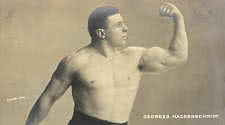George Hackenschmidt - The Original Russian Lion Muscle Man

It's often men such as these paved the way for those to come afterwards.
He was called "The Russian Lion," and for much of his early life George Hackenschmidt wrestled his foes with a leonine ferocity. When Hackenschmidt ceased to roar, however, he
revealed an unexpectedly quiet, philosophical side as well.
The Russian Lion was actually Estonian, since he was born in Dorpat in that Baltic state on August 2, 1878. His parents wanted their son to be an engineer, but when he was 17
George discovered that the lure of sports was too great to resist. He dropped out of the apprenticeship program he was in and devoted himself to various athletic pursuits.
Beginning in 1896 the activity that increasingly dominated his life was wrestling. That was the year Hackenschmidt grappled with fellow Estonian and professional wrestler George
Lurich. Due to his inexperience, Hackenschmidt suffered a humiliating loss, but it proved to be one of his few defeats ever.
Hackenschmidt continued to compete despite the setback, and gradually his reputation as a wrestler began to spread. He started lifting weights and breaking records as an amateur
in Estonia. In 1898 the 20-year-old athlete had an opportunity lo go to St. Petersburg, where he met a trainer who changed his life.
Vladislav Krajevski was a physician who had discovered the value of iron pumping relatively late in life. This pioneering doctor introduced young Hackenschmidt to the science
and art of progressive-weight training. Since he was already blessed with a massive frame. George was soon making rapid gains under the doctor's careful coaching.
It wasn't long before the muscular lifter got a chance to show off both his new strength and his mighty physique. Hackenschmidt began to enter lifting and wrestling meets, and
now he was nearly always victorious. As it was wrestling that was the more popular sport, however, young George concentrated his efforts in this lucrative arena.
"The Russian Lion" as he was soon dubbed by the press, racked up victory after victory on the wrestling mats of continental Europe. In 1902 he decided to try his luck in England,
and "Hack" as the British affectionately called him. found few opponents who could give him a real challenge.
Hackenschmidt's match with Ahmed Madrali, "the Terrible Turk," was indicative of his grappling career at this time. Madrali was a huge bear of a man with a shaved head and thick
physique. He promised to give Hack a run for his money. Nevertheless, the event was over quickly: The Russian grabbed Madrali, lifted him in the air and slammed him to the mat.
One re-porter complained that he dropped his program when the match began, and by the time he picked it up Hack had won.
Soon Hackenschmidt was collecting huge fees, sometimes earning as much as $1,750 per week. In 1904, 6,000 people watched him defeat American wrestler Tom Jenkins at Madison Square
Garden. All went well until George was paired up against arch rival Frank Gotch. In this match Hack received a terrific knee injury that ended his wrestling career in one fell
swoop. With his grappling days behind him Hackenschmidt turned to more intellectual pursuits. The Russian Lion was no fool, and he had a first-class mind to go with his massive
musculature. He became interested in philosophy and ended up writing eight books with such arcane titles as Man and Cosmic Antagonism to Mind and Spirit and The Three Memories
and Forgetfulness.
One of George's fondest goals was to open a school of physical training in England, where he hoped to use his complicated psycho-physical philosophy to revolutionize physical
culture entirely. Unfortunately, Hack never had the opportunity to put his cerebral theories into practice. While he was visiting his villa in the south of France in 1939, World
War II suddenly began, and he was trapped there for the duration.
By the time Hackenschmidt finally returned to England in 1945, the world had changed and no one seemed interested in his metaphysical training tips any more. Although he could not
wrestle the foes of flesh and blood any longer, he continued to combat his inner demons with a youthful ferocity.
Hack once likened himself to the thoughtful fighter in Shakespeare's As You Like It who declares, "I wrestle for my credit." "I, too, wrestled for my credit," Hackenschmidt
remarked, "and when I left the ring forever, I continued to wrestle for my credit in the fields of education and philosophy." Hackenschmidt's lofty struggles were ended only by his
death on February 19, 1968.